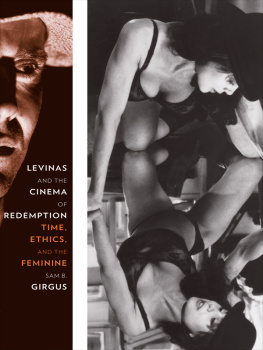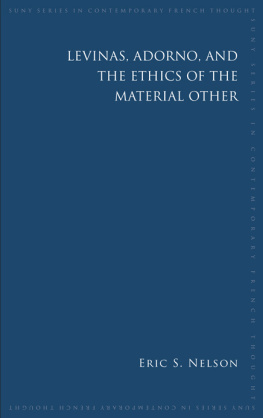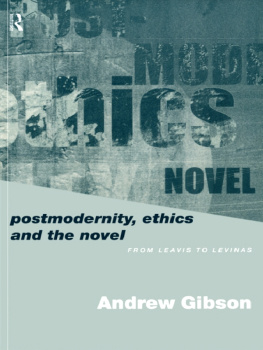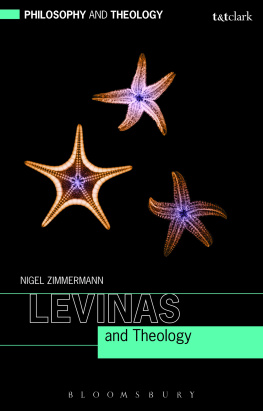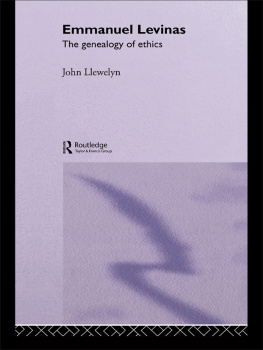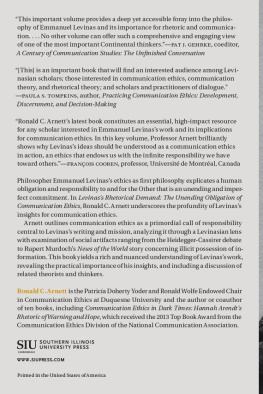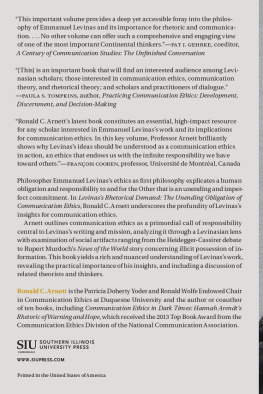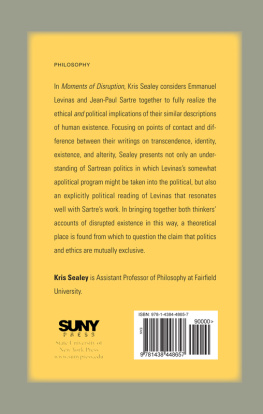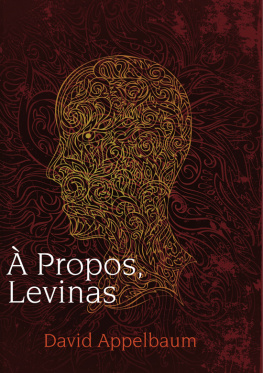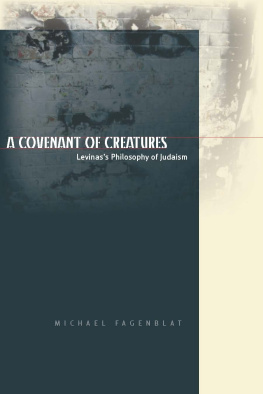LEVINAS
AND THE
CINEMA
OF
REDEMPTION
FILM AND CULTURE SERIES John Belton, General Editor
FILM AND CULTURE
A series of Columbia University Press
EDITED BY JOHN BELTON
What Made Pistachio Nuts? Early Sound Comedy and the Vaudeville Aesthetic
HENRY JENKINS
Showstoppers: Busby Berkeley and the Tradition of Spectacle
MARTIN RUBIN
Projections of War: Hollywood, American Culture, and World War II
THOMAS DOHERTY
Laughing Screaming: Modern Hollywood Horror and Comedy
WILLIAM PAUL
Laughing Hysterically: American Screen Comedy of the 1950s
ED SIKOV
Primitive Passions: Visuality, Sexuality, Ethnography, and Contemporary Chinese Cinema
REY CHOW
The Cinema of Max Ophuls: Magisterial Vision and the Figure of Woman
SUSAN M. WHITE
Black Women as Cultural Readers
JACQUELINE BOBO
Picturing Japaneseness: Monumental Style, National Identity, Japanese Film
DARRELL WILLIAM DAVIS
Attack of the Leading Ladies: Gender, Sexuality, and Spectatorship in Classic Horror Cinema
RHONA J. BERENSTEIN
This Mad Masquerade: Stardom and Masculinity in the Jazz Age
GAYLYN STUDLAR
Sexual Politics and Narrative Film: Hollywood and Beyond
ROBIN WOOD
The Sounds of Commerce: Marketing Popular Film Music
JEFF SMITH
Orson Welles, Shakespeare, and Popular Culture
MICHAEL ANDEREGG
Pre-Code Hollywood: Sex, Immorality, and Insurrection in American Cinema, 19301934
THOMAS DOHERTY
Sound Technology and the American Cinema: Perception, Representation, Modernity
JAMES LASTRA
Melodrama and Modernity: Early Sensational Cinema and Its Contexts
BEN SINGER
Wondrous Difference: Cinema, Anthropology, and Turn-of-the-Century Visual Culture
ALISON GRIFFITHS
Hearst Over Hollywood: Power, Passion, and Propaganda in the Movies
LOUIS PIZZITOLA
Masculine Interests: Homoerotics in Hollywood Film
ROBERT LANG
Special Effects: Still in Search of Wonder
MICHELE PIERSON
Designing Women: Cinema, Art Deco, and the Female Form
LUCY FISCHER
Cold War, Cool Medium: Television, McCarthyism, and American Culture
THOMAS DOHERTY
Katharine Hepburn: Star as Feminist
ANDREW BRITTON
Silent Film Sound
RICK ALTMAN
Home in Hollywood: The Imaginary Geography of Hollywood
ELISABETH BRONFEN
Hollywood and the Culture Elite: How the Movies Became American
PETER DECHERNEY
Taiwan Film Directors: A Treasure Island
EMILIE YUEH-YU YEH AND DARRELL WILLIAM DAVIS
Shocking Representation: Historical Trauma, National Cinema, and the Modern Horror Film
ADAM LOWENSTEIN
China on Screen: Cinema and Nation
CHRIS BERRY AND MARY FARQUHAR
The New European Cinema: Redrawing the Map
ROSALIND GALT
George Gallup in Hollywood
SUSAN OHMER
Electric Sounds: Technological Change and the Rise of Corporate Mass Media
STEVE J. WURTZLER
The Impossible David Lynch
TODD MCGOWAN
Sentimental Fabulations, Contemporary Chinese Films: Attachment in the Age of Global Visibility
REY CHOW
Hitchcocks Romantic Irony
RICHARD ALLEN
Intelligence Work: The Politics of American Documentary
JONATHAN KAHANA
Eye of the Century: Film, Experience, Modernity
FRANCESCO CASETTI
Shivers Down Your Spine: Cinema, Museums, and the Immersive View
ALISON GRIFFITHS
Weimar Cinema: An Essential Guide to Classic Films of the Era
NOAH ISENBERG
African Film and Literature: Adapting Violence to the Screen
LINDIWE DOVEY
Film, A Sound Art
MICHEL CHION
Film Studies: An Introduction
ED SIKOV
Hollywood Lighting from the Silent Era to Film Noir
PATRICK KEATING


COLUMBIA UNIVERSITY PRESS
Publishers Since 1893
New York Chichester, West Sussex
cup.columbia.edu
COPYRIGHT 2010 COLUMBIA UNIVERSITY PRESS
All rights reserved
E-ISBN 978-0-231-51949-6
Library of Congress Cataloging-in-Publication Data
Girgus, Sam B., 1941
Levinas and the cinema of redemption : time, ethics, and the feminine/Sam B. Girgus.
p. cm. (Film and culture)
Includes bibliographical references and index.
ISBN 978-0-231-14764-4 (cloth : alk. paper) ISBN 978-0-231-14765-1 (pbk : alk. paper) ISBN 978-0-231-51949-6 (e-book)
1. Motion picturesMoral and ethical aspects. 2. Motion picturesPhilosophy. 3. Redemption in motion pictures. 4. Lvinas, EmmanuelCriticism and interpretation.
I. Title. II. Series.
PN1995.5.G57 2010
791.43'684dc22
2009045451
A Columbia University Press E-book.
CUP would be pleased to hear about your reading experience with this e-book at .
References to Internet Web sites (URLs) were accurate at the time of writing. Neither the author nor Columbia University Press is responsible for URLs that may have expired or changed since the manuscript was prepared.
DESIGN BY MARTIN N. HINZE
To our grandchildren Arielle Gianni, Zachary Isaac (Ziggy), Mia Victoria, and Maxwell Scot-Smith; their parents, Katya and Jeff and Meighan and Ali; and Jennifer and Scottie
CONTENTS
For the past several years I have been fortunate to pursue a new area of studythe difficult ethical philosophy of Emmanuel Levinasin the excellent company of outstanding Vanderbilt University students. Many of the ideas in this book grew out of those classroom encounters. I have cherished this learning experience and look forward to more. I am grateful to each and every student for the opportunity to study and learn together. I hope they also have gained from what my colleague Gregg Horowitz has called my journey.
Indeed, as our work progressed, I came to realize that I was neighbors on campus with some of the leading philosophers in this new field for me of phenomenology and ethics. I am therefore especially appreciative for the support I received from David Wood and Kelly Oliver. Also in the Philosophy Department, I wish to thank Lisa Guenther, Katharine Loevy, J. Aaron Simmons, John Lachs, Charles Scott, and Gregg. A grant from Dan Cornfields Vanderbilt Center for Nashville Studies, among other grants and funds, enabled other outstanding scholars in film, philosophy, and American studies to speak on campus. Their talks, conversation, and presence helped to create a special ambience on campus for students and colleagues with interests in these fields. Their work appears throughout this book. In philosophy these scholars include John Llewelyn, Tina Chanter, Simon Critchley, Ewa Ziarek, and Richard Cohen. In film I especially wish to thank John Belton, Anne Kern, Dudley Andrew, Peter Bailey, David Rodowick, and Rebecca Bell-Metereau. In American studies Thadious M. Davis, a special friend for years, returned to campus for a talk on ethics and race in America. Whether speaking on campus or writing about American studies, American literature, or Jewish studies, Sacvan Bercovitch remains a seminal influence.
Over several decades Emory Elliotts influence, friendship, and support pervaded American literary scholarship and American studies. He deeply touched the lives of an extraordinary number of people in these fields. His support and generosity proved crucial to many of us in all stages of our careers. As Michael Kreyling said about him after one of his visits, Every time Emory comes here, he makes you feel better about yourself and your work. Emorys sudden death has been a devastating and unrecoverable loss to us as individuals and to the disciplines he inspired and led. His many visits to campus were vital events for American studies and American literature at Vanderbilt.
Next page
